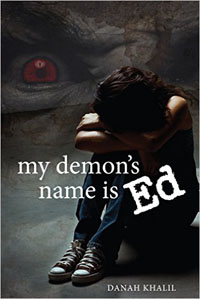| ________________
CM . . .
. Volume XXII Number 41. . . .June 22, 2016

 |
My Demon’s Name is Ed.
Danah Khalil.
Toronto, ON: Second Story Press, 2016.
240 pp., trade pbk., $12.95.
ISBN 978-1-927583-96-8.
Grades 8-12 / Ages 13-17.
Review by Rob Bittner.
** /4
Reviewed from Advance Reading Copy.
|
| |
|

excerpt:
I look in the mirror and can’t distinguish between the hazy image of Ed, the demon, desperately pleading for attention and recognition and my own reflection that should be staring back at me. The demon tells me that I am too fat, that my inner thigh gap should be more noticeable, and my stomach should be flatter. It whispers in my ear—gently and soothingly, at first. Then the whispers become roars as it spits in my face. What choice do I have but to obey? I am too weak to fight; I am too afraid to try.
Author Danah Khalil started keeping a journal of her experiences with anorexia as a teenager and has now published them in novel form. She imagines her eating disorder in the personified form of Ed, the demon—Ed, of course, is the acronym for “eating disorder”. Through the novel she explores the development of her disorder, her attempts to get healthy again, and the struggles she has with parents and friends as she works through her own self-harming behaviours. The novel is published in the format of a journal, but it is also—at least in part—a novel in verse. The voice of Ed is italicized throughout, and, although his moments in the spotlight are brief, he is a continual presence throughout the text.
Thought I respect the novel in verse and the diary format in general, the mix of the two is not as effective as I feel it could have been if the narrative was told either in verse or as a journal. I believe the poetic devices being used are meant to cause feelings of instability and uneasiness. The breaks in sentences and the mixture between poetry and prose are often jarring, and for good reason, I believe, but at the same time, I found myself very much conscious of these switches, drawing me out of the story more often that I would have liked. The raw nature of this true story is one that I appreciate. It is a real story. Khalil has poured her heart and soul onto the pages of this novel. And I am fully conscious of how much emotional effort and energy must have gone into this text.
Unfortunately, as much as I felt connected to the protagonist, I found the consistent repetition of the entries and the voice of Ed to be quite annoying by the mid-way point. Because we are witness to Khalil and Khalil alone, the novel becomes unnecessarily long and repetitive, and reveals that could have helped to make the book more fully rounded and complete are left until the end of the novel, when it is almost too late to fully appreciate. Ed’s voice, as well, was unfortunately very didactic, leading to a feeling that readers are to be taught. Cliché turns of phrase led to a less than fully developed and engaging novel in the end.
All of this being said, I very much appreciate Khalil’s willingness to bare her life on the printed page and share her story. There will be an audience for the content of the book, but the combination of content with form unfortunately leaves My Demon’s Name is Ed wanting and not entirely engaging as one would hope.
Recommended with Reservations.
Rob Bittner is a graduate of the MA in Children’s Literature program at The University of British Columbia in Vancouver, BC. He is currently a doctoral candidate in Gender, Sexuality, and Women’s Studies at Simon Fraser University.

To comment
on this title or this review, send mail to cm@umanitoba.ca.
Copyright © the Manitoba Library Association. Reproduction for personal
use is permitted only if this copyright notice is maintained. Any
other reproduction is prohibited without permission.
Next Review | Table of Contents For This Issue - June 22, 2016
CM Home | Back Issues
| Search
| CM Archive
| Profiles Archive
|
